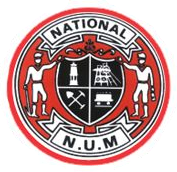External links
| This article about an organisation in the United Kingdom is a stub. You can help Wikipedia by expanding it. |
The National Association of British Manufacturers (NABM), formerly the National Union of Manufacturers (NUM), was an employers' association in the United Kingdom.
Founded in 1915 as the British Manufacturers' Association (BMA), it was renamed the National Union of Manufacturers in 1917 and the National Association of British Manufacturers in 1961. It was particularly strong among small and middle-sized firms. It merged with the Federation of British Industries and the British Employers' Confederation in 1965 to form the Confederation of British Industry.
| This article about an organisation in the United Kingdom is a stub. You can help Wikipedia by expanding it. |
A trade union is an association of workers forming a legal unit or legal personhood, usually called a "bargaining unit", which acts as bargaining agent and legal representative for a unit of employees in all matters of law or right arising from or in the administration of a collective agreement. Labour unions typically fund the formal organization, head office, and legal team functions of the labour union through regular fees or union dues. The delegate staff of the labour union representation in the workforce are made up of workplace volunteers who are appointed by members in democratic elections.
The miners' strike of 1984–85 was a major industrial action to shut down the British coal industry in an attempt to prevent colliery closures. It was led by Arthur Scargill of the National Union of Mineworkers (NUM) against the National Coal Board (NCB), a government agency. Opposition to the strike was led by the Conservative government of Prime Minister Margaret Thatcher, who wanted to reduce the power of the trade unions.

The Confederation of Swedish Enterprise or Swedish Enterprise is a major employers' organization for private sector and business sector companies in Sweden. It has 49 member associations representing 60,000 member companies with more than 1.6 million employees.

The National Union of Mineworkers (NUM) is a trade union for coal miners in Great Britain, formed in 1945 from the Miners' Federation of Great Britain (MFGB). The NUM took part in three national miners' strikes, in 1972, 1974 and 1984–85. After the 1984–85 strike and the subsequent closure of most of Britain's coal mines, it became a much smaller union. It had around 170,000 members when Arthur Scargill became leader in 1981, a figure which had fallen in 2015 to an active membership of around 100.
Num may refer to:
The Confederation of Finnish Industries is the largest employers' association in Finland. It was formed at the beginning of 2005 when the two employers' associations Palvelutyönantajat and Teollisuuden ja Työnantajain Keskusliitto merged. EK's member companies collectively contribute over 70% of Finland's GDP, and over 95% of Finland's exports. It has considerable negotiating power, since Finland has universal validity of collective labour agreements, and often a national income policy agreement is reached.
The Australian Industry Group, also called Ai Group, is an employers' organisation, whose members employ over 750,000 people throughout Australia. The organisation covers a wide range of industries including manufacturing, engineering, construction, automotive, food, transport, information technology, telecommunications, call centres, labour hire, printing, defence, mining equipment and supplies, airlines, and other related service industries. It is one of the largest industry organisations in Australia.

The Australian Chamber of Commerce and Industry is Australia's largest and most representative business association, comprising state and territory chambers of commerce and national industry associations.
The Federation of British Industries (FBI) was an employers' association in the United Kingdom.
The NHS Confederation, formerly the National Association of Health Authorities and Trusts, is a membership body for organisations that commission and provide National Health Service services founded in 1990. The predecessor organisation was called The National Association of Health Authorities in England & Wales.

The Modern Records Centre (MRC) is the specialist archive service of the University of Warwick in Coventry, England, located adjacent to the Central Campus Library. It was established in October 1973 and holds the world's largest archive collection on British industrial relations, as well as archives relating to many other aspects of British social, political and economic history.
Trade unions in South Africa have a history dating back to the 1880s. From the beginning unions could be viewed as a reflection of the racial disunity of the country, with the earliest unions being predominantly for white workers. Through the turbulent years of 1948–1991 trade unions played an important part in developing political and economic resistance, and eventually were one of the driving forces in realising the transition to an inclusive democratic government.
An employers' organization or employers' association is a collective organization of manufacturers, retailers, or other employers of wage labor. Employers' organizations seek to coordinate the behavior of their member companies in matters of mutual interest, such as during negotiations with trade unions or government bodies. Employers' organizations operate like trade unions and promote the economic and social interests of its member organisations.
The British Furniture Confederation (BFC) is a lobby group that represents the furniture and bed making industries of the United Kingdom. It ensures that the views of its members are heard by Parliamentarians and government Ministers and is active in Westminster working on behalf of the industry.
Ibec is the largest business lobby group and largest lobbying organisation in Ireland. It represents business of all sizes spanning every sector of the economy, together employing 70% of the private sector workforce in Ireland.

The Home Builders Federation (HBF) is a trade association representing private sector homebuilders in England and Wales. Its members deliver around 80% of new homes built each year.
The British Employers' Confederation (BEC), formerly the National Confederation of Employers' Organisations (NCEO), was an employers' association in the United Kingdom.
The National Federation of Colliery Officials was a trade union representing colliery workers in the United Kingdom who were not involved in manual labour.